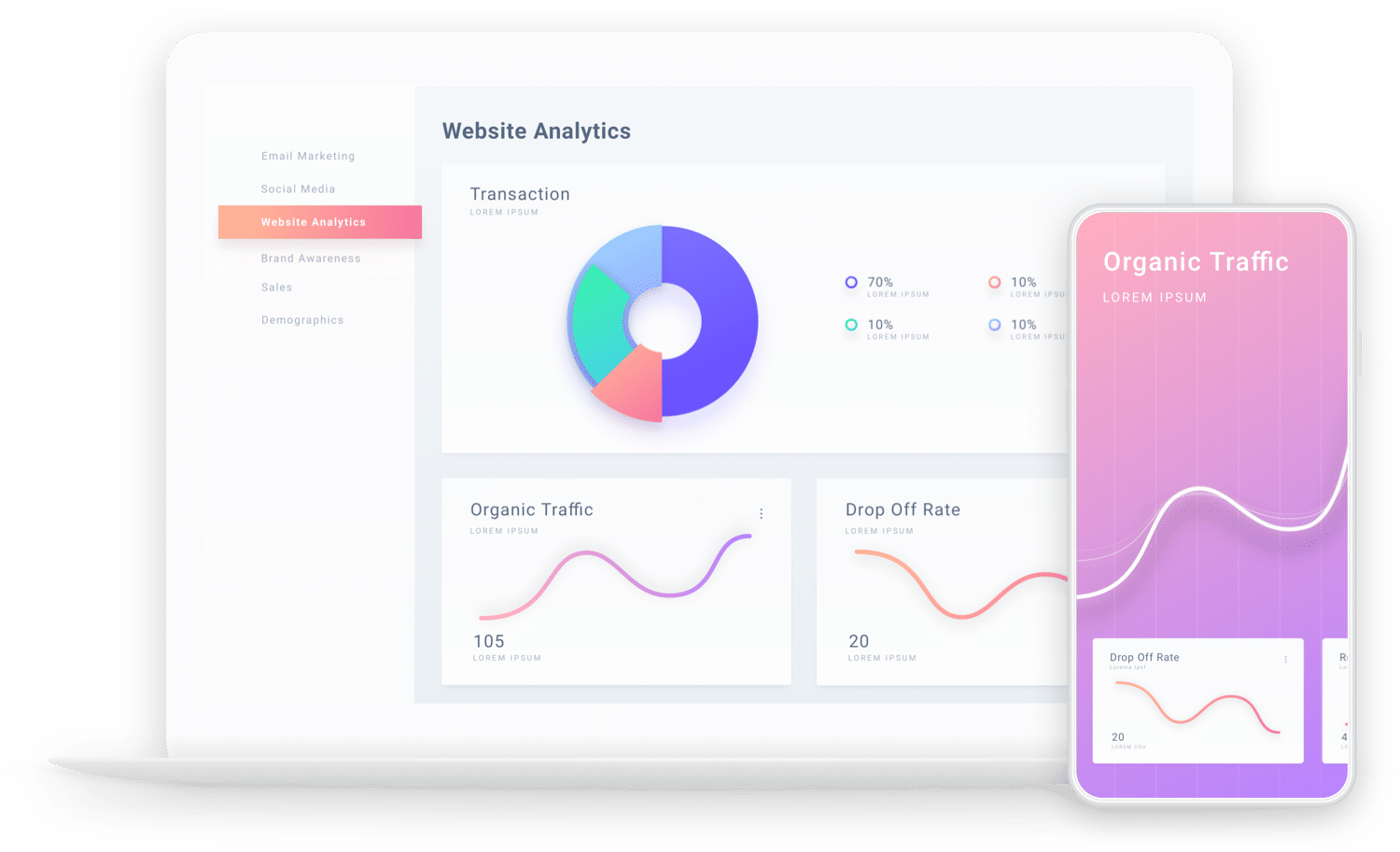
Mastering SEO for Law Firms: A Comprehensive Guide
In today’s digital age, the success of a law firm is closely tied to its online presence. With millions of people turning to the internet to seek legal services, having a well-optimized website has become a necessity rather than a luxury.
This guide serves as an introduction to SEO (Search Engine Optimization) for law firms, shedding light on why it’s essential, what it entails, and the significant benefits it brings to the legal profession.
The Importance of SEO for Law Firms
Imagine this scenario: a potential client faces a legal issue and is seeking the services of a law firm. Like most people, they pull out their smartphone or sit down at their computer and type relevant keywords into a search engine. They’re looking for answers, guidance, and, ultimately, a trusted legal professional to help them navigate their legal concerns.
This is where the importance of SEO for law firms becomes crystal clear. SEO is the practice of optimizing your website to rank higher in search engine results when people search for relevant keywords. For law firms, it’s the key to being discovered online.
A well-executed SEO strategy ensures that your law firm’s website appears at or near the top of search engine results pages (SERPs). This high visibility is crucial because research shows that the majority of clicks go to the top results. If your website doesn’t rank well, you’re missing out on potential clients who are actively searching for the legal services you offer.


What SEO Entails
At its core, SEO involves a combination of strategies and techniques aimed at improving your website’s visibility on search engines. Here’s a brief outline of what SEO entails:
1. Keyword Research: SEO begins with in-depth keyword research. This involves identifying the words and phrases that potential clients are likely to use when searching for legal services. For example, someone looking for a divorce attorney in New York might search for “New York divorce lawyer.” Understanding these keywords is the foundation of effective SEO.
2. On-Page Optimization: Once you have your target keywords, you need to optimize your website’s on-page elements. This includes optimizing title tags, meta descriptions, header tags, and ensuring that your content is informative and relevant to your target audience.
3. Local SEO: For law firms, local SEO is particularly important. This involves optimizing your online presence to appear in local search results. It includes setting up and optimizing your Google My Business profile, acquiring local citations, and encouraging client reviews.
4. Content Creation: Producing high-quality, informative, and engaging content is a core aspect of SEO. Regularly publishing content that addresses common legal questions or concerns can establish your law firm as an authoritative source of information.
5. Link Building: Building high-quality backlinks to your website from reputable sources is another crucial element of SEO. Quality backlinks can significantly boost your website’s authority in the eyes of search engines.
The Benefits of a Well-Optimized Website for Law Firms
So, why should law firms invest in SEO? Here are some of the benefits that come with a well-optimized website:
Increased Visibility: As mentioned earlier, SEO helps your website rank higher in search results, increasing the likelihood of potential clients finding you online.
Cost-Effective Marketing: Compared to traditional advertising methods, SEO is a cost-effective way to reach a targeted audience actively searching for legal services.
Credibility and Trust: High search engine rankings convey trust and credibility to potential clients, making them more likely to choose your firm over competitors.
Targeted Marketing: SEO allows you to target specific keywords and demographics relevant to your practice areas, ensuring that you reach the right audience.
Adaptation to Changing Trends: SEO is dynamic and evolves with changes in consumer behavior and technology. Staying current with SEO best practices ensures your firm remains competitive in a rapidly changing digital landscape.
In conclusion, SEO is no longer an option but a necessity for law firms looking to thrive in the digital era. It’s essential to increasing online visibility, attracting potential clients, and establishing your firm as a trustworthy source of legal expertise.
As we delve deeper into the world of SEO for law firms, you’ll discover specific strategies and techniques to implement for a successful SEO campaign.

Managing Expectations
SEO is a process that requires patience and consistency to achieve the best outcomes. SEO can deliver amazing returns on your investment over time, but only if you do it right. When you hire SEO services for your law firm, you should be realistic about how long it will take to see results. A well-implemented SEO strategy can take up to a year to generate significant traffic.
According to Semrush, it typically takes 4-12 months for SEO to work, depending on various factors such as your goals, resources, strategy, competition, and website’s history.
However, some SEO experts suggest that you can start seeing results within a few months if you target low-competition keywords and create quality content. And don’t worry about the slow drip of traffic, once it starts coming in, it can grow exponentially. The key is to stay committed to your strategy and keep executing it over the long term.
Keyword Research for Law Firms
Keyword research is all about understanding the language your potential clients speak and ensuring your law firm’s website is speaking it fluently. Let’s delve a little into the crucial aspects of keyword research for law firms, including its significance and strategies to uncover the most relevant legal keywords.
Performing Keyword Research Specific to Law Firms
Keyword research for your law firm goes beyond basic searches and requires a tailored approach.
Here’s a step-by-step guide on how to perform keyword research specific to the legal field:
Identify Your Practice Areas
Start by listing the primary practice areas your law firm specializes in, such as “family law,” “personal injury,” “criminal defense,” or “corporate law.” These will serve as the foundation for your keyword research.
Brainstorm Seed Keywords
Generate a list of seed keywords related to each practice area. For instance, under “personal injury,” you might include keywords like “car accident lawyer” or “personal injury attorney.”
Utilize Keyword Research Tools
Employ keyword research tools such as Google Keyword Planner, Ahrefs, SEMrush, or Moz Keyword Explorer to expand your list. These tools provide data on search volume, competition, and related keywords. Enter your seed keywords to discover new keyword ideas. Learn what we love to use for keyword research.
Analyze Competitor Keyword
Investigate the keywords your competitors are targeting. This can provide valuable insights into what keywords are relevant in your legal niche. Tools like SEMrush can help you identify competitor keywords.
Consider Long-Tail Keywords
In addition to broad keywords, focus on long-tail keywords—more specific phrases that potential clients might use in their search. For example, “child custody attorney in New York.”
Prioritize Keywords
Once you have a comprehensive list, prioritize keywords based on search volume, relevance, and competition. It’s crucial to balance between high-traffic keywords and those that are more attainable. Check out our guide to mastering keyword research here.

The Importance of Targeting Relevant Legal Keywords
Why is it essential to target relevant legal keywords in your SEO strategy? Here are key reasons:
Connect with Your Audience: Using legal keywords ensures your content resonates with individuals actively seeking legal services. It helps you establish a direct connection with potential clients.
Enhance Visibility: Optimizing your website for relevant keywords improves your chances of ranking higher in search engine results. When your website appears prominently, it attracts more organic traffic.
Quality Leads: Targeting legal keywords narrows down your audience to those genuinely interested in legal services. This increases the likelihood of attracting high-quality leads who are more likely to convert into clients.
Competitive Advantage: Legal keyword research allows you to identify keywords that your competitors may have overlooked. This can give you a competitive edge in the online market.
Tools and Strategies for Effective Keyword Research
Here are some tools and strategies to optimize your keyword research for law firms:
Google Keyword Planner: This free tool provides valuable insights into keyword search volume and competition. It’s a great starting point for keyword research.
Long-Tail Keywords: Don’t underestimate the power of long-tail keywords. They often have lower competition and can bring in highly targeted traffic.
Location-Based Keywords: Incorporate location-based keywords if your law firm serves a specific geographic area. For example, “divorce lawyer in Los Angeles.”
Competitor Analysis: Analyze the keywords your competitors are ranking for. Identify gaps and opportunities in their strategies.
User Intent: Consider the intent behind the keywords. Are users looking for information, services, or specific legal guidance? Tailor your content accordingly.
Old vs New Keyword Research
Here’s the major difference between what we used to do for keyword research and the approach we use today:
It used to be about targeting specific keywords now it’s about targeting specific topics. What’s the difference? It’s the shallow vs deep approach. Instead of targeting a bunch of non-related keywords that you believe you may rank for, target a topic that serves as a central theme to establish other related content around.
Here’s another way to understand it:
Imagine keyword research as a game of darts: In the old days, it was all about hitting that one bullseye – targeting a single keyword with low difficulty, hoping for a high score. Now, enter the era of topical authority – it’s like hosting a darts championship! Instead of aiming for just one spot, you’re covering the whole dartboard with a cluster of darts.
This strategy is not about hitting one lucky shot; it’s about consistently hitting the mark across a range of related topics.
By creating a topical cluster, you’re not just whispering a single keyword into the vast internet void; you’re orchestrating a symphony of related terms, building a fortress of relevance around your main keyword.
It’s like having a conversation instead of just blurting out a word.
The result? Search engines see you not just as a one-hit wonder, but as a maestro in your field, leading to better visibility, authority, and a parade of digital confetti in the form of higher rankings.
Okay enough with the metaphors. Learn more about topical clusters here.
On-Page SEO for Law Firm Websites: Elevating Your Online Presence
In the competitive realm of digital marketing, on-page SEO techniques tailored specifically for law firm websites can be a game-changer. It’s the art of optimizing your web pages to enhance their visibility on search engines like Google and Bing. In this article, we’ll explore the crucial elements of on-page SEO for law firms, including optimizing title tags, meta descriptions, header tags, and the importance of high-quality, legal-specific content.
Title Tags: Your page’s title tag is like the headline of a newspaper article – it’s the first thing users see in search results. For law firm websites, ensure that your title tags are not only concise but also include relevant keywords. For instance, a title tag for a personal injury page could be “Experienced Personal Injury Attorneys in [Your City].”
Meta Descriptions: A well-crafted meta description provides a brief summary of what users can expect when they click on your page. It should also contain keywords related to the page’s content. In the context of a law firm, a meta description might read, “Trust our team of expert attorneys to handle your legal needs with care and precision.”
Header Tags: Header tags (H1, H2, H3, etc.) organize the content on your page and help search engines understand its structure. Use H1 tags for main headings and H2 and H3 tags for subheadings. Include keywords where relevant while ensuring that the content remains natural and readable.


The Significance of High-Quality, Legal-Specific Content
Creating high-quality, legal-specific content is not just about appeasing search engines; it’s about providing value to your audience. Here’s why it matters:
Expertise and Authority: Law firms are trusted advisors in legal matters. Your content should reflect your expertise and establish your firm as an authority in your practice areas. This not only attracts potential clients but also builds trust.
User Experience: Well-written, informative content enhances the user experience. It answers common legal questions, educates your audience, and guides them toward making informed decisions. Satisfied users are more likely to engage with your services.
Keyword Integration: Incorporate your target keywords naturally into your content. Address legal topics, common concerns, and relevant advice. For example, a family law page can include content about divorce proceedings, child custody, and spousal support.
Freshness Matters: Regularly update your content to stay current with legal trends and changes. This signals to search engines that your website is a reliable source of up-to-date information.
Local Optimization: If your law firm serves specific geographic areas, consider local SEO techniques. Include location-based keywords to attract clients in your vicinity
A Note About Using A.I Content
A little side-note to keep in mind for using A.I, high-quality content will be the what separates you from your competition. AI is a great tool to use for outlines, drafts and even parts of your content, but don’t rely on it for 100% of your site.
Especially when it comes to specialized industries such as the legal field, you want to make your expertise known to your readers and Google. Using nothing but AI can turn your years of experience into a great big ball of generic content.
Enhancing Local Visibility for Law Firms through SEO
Local SEO holds a pivotal role in the marketing strategies of law firms. It goes beyond national or global reach; it’s about establishing a strong presence within your local community.
Optimizing Google My Business Profiles
To leverage local SEO effectively, optimizing your Google My Business (GMB) profile is key. Start by claiming and verifying your law firm’s GMB profile, ensuring its accurate representation in Google search and maps. Thoroughly complete your profile, including your firm’s name, address, phone number (NAP), website URL, hours of operation, and a concise yet informative service description.
Choose categories that precisely depict your law firm’s practice areas, aiding Google in understanding your legal services. Upload high-quality images showcasing your law firm’s office and team, reinforcing professionalism. Regularly update your GMB profile with any changes, demonstrating that your information is accurate and up to date.
Generating Reviews and Citations
Generating reviews and citations form the core of local SEO success. Actively encourage reviews from satisfied clients, as positive reviews not only enhance your online reputation but also impact your local search ranking. Engage with reviews, responding promptly and professionally to both positive and negative feedback.
Responsiveness showcases your commitment to client satisfaction. Ensure your law firm’s name, address, and phone number (NAP) information remains consistent across all online platforms, and consider leveraging legal directories like Avvo and FindLaw to generate valuable citations.
The Significance of Backlinks for SEO
Backlinks, also known as inbound or incoming links, are links from external websites to your law firm’s website. They serve as a vote of confidence from other websites, signaling to search engines that your content is valuable and trustworthy. Here’s why backlinks are crucial for law firm SEO:
Improved Visibility: High-quality backlinks enhance your website’s authority, leading to higher search engine rankings. This increased visibility helps potential clients find your law firm’s website.
Trust and Credibility: Backlinks from reputable sources build trust and credibility with both search engines and users. They signify that your law firm is a trusted resource in the legal field.


Comprehensive SEO Services: Beyond Rankings
Create Exceptional Content: Producing high-quality, informative, and shareable content is the foundation of successful link building. Legal blog posts, case studies, or authoritative guides can naturally attract backlinks from other websites.
Leverage Legal Directories: Many legal directories allow you to list your law firm and include a backlink to your website. Ensure your law firm is listed in reputable legal directories to acquire valuable backlinks.
Guest Posting: Collaborate with other legal websites or blogs by offering to write guest posts. Guest posting provides an opportunity to showcase your expertise and earn backlinks to your website.
Network within the Legal Community: Build relationships with other law firms, legal professionals, and organizations. Networking can lead to natural backlinks when they reference your law firm’s content or services.
Content (Marketing) is King
Content marketing is the driving force behind law firm SEO success. It builds authority, optimizes for keywords, and engages users. Crafting informative legal content, promoting it through various channels, and continually analyzing its performance are essential steps to attract organic traffic and elevate your law firm’s online presence.
Authority Builder: High-quality, informative content establishes your law firm as an authoritative source in your legal niche. It attracts trust from both users and search engines.
Keyword Optimization: Through content, you can strategically incorporate keywords related to your practice areas, boosting your search engine rankings.
Engagement and Retention: Engaging content keeps users on your site longer, reducing bounce rates and signaling to search engines that your site is valuable.
Know Your Audience: Understand the needs and questions of your target audience. What legal information are they seeking? Tailor your content to address their concerns.
Educate and Inform: Offer value through educational content. Explain legal concepts, provide guidance, and answer common legal questions in a clear and accessible manner.
Originality Matters: Create unique content that stands out. Avoid duplicate content, as it can harm your SEO efforts.
Quality Over Quantity: Focus on producing high-quality content rather than churning out numerous articles. Well-researched, well-written content is more likely to engage and convert readers.
Guest Posting: Collaborate with other legal websites to publish guest posts. It’s an effective way to reach new audiences and build backlinks.
Monitor and Analyze: Use tools like Google Analytics to monitor the performance of your content. Identify what works and adjust your content strategy accordingly.
Last But Not Least…Technical SEO
Technical SEO is the invisible foundation upon which websites stand. It optimizes site speed, mobile-friendliness, and structure, resulting in an enhanced user experience and improved search rankings.
Employing tools and adhering to best practices for technical SEO ensures your law firm’s website not only attracts potential clients but also provides them with a seamless, satisfying online journey.

